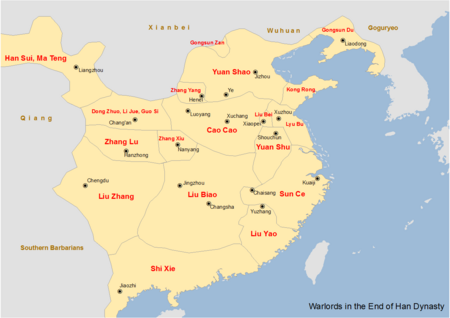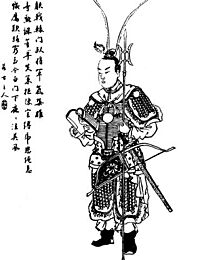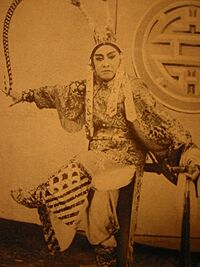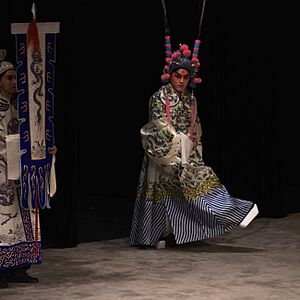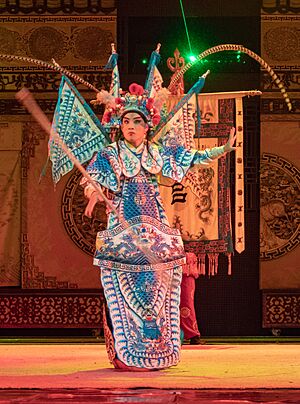Lü Bu facts for kids
Quick facts for kids
Lü Bu
|
|||||||||||||||||||||||
|---|---|---|---|---|---|---|---|---|---|---|---|---|---|---|---|---|---|---|---|---|---|---|---|
| 呂布 | |||||||||||||||||||||||
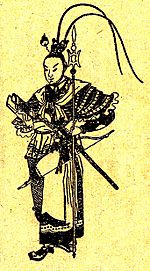
A Qing dynasty illustration of Lü Bu
|
|||||||||||||||||||||||
|
|||||||||||||||||||||||
| In office 197–199 |
|||||||||||||||||||||||
| Monarch | Emperor Xian of Han | ||||||||||||||||||||||
| General of Vehement Might (奮威將軍) | |||||||||||||||||||||||
| In office 192–197 |
|||||||||||||||||||||||
| Monarch | Emperor Xian of Han | ||||||||||||||||||||||
| Personal details | |||||||||||||||||||||||
| Born | before 161 Jiuyuan County, Wuyuan Commandery (now Jiuyuan District, Baotou City, Inner Mongolia, China) |
||||||||||||||||||||||
| Died | 7 February 199 Xiapi County, Xiapi Commandery |
||||||||||||||||||||||
| Occupation | Military general, politician, warlord | ||||||||||||||||||||||
| Chinese name | |||||||||||||||||||||||
| Traditional Chinese | 呂布 | ||||||||||||||||||||||
| Simplified Chinese | 吕布 | ||||||||||||||||||||||
|
|||||||||||||||||||||||
| Courtesy name | |||||||||||||||||||||||
| Chinese | 奉先 | ||||||||||||||||||||||
|
|||||||||||||||||||||||
| Nickname | |||||||||||||||||||||||
| Chinese | 飛將 | ||||||||||||||||||||||
| Literal meaning | Flying General | ||||||||||||||||||||||
|
|||||||||||||||||||||||
| Marquis of Wen | |||||||||||||||||||||||
| Chinese | 溫侯 | ||||||||||||||||||||||
|
|||||||||||||||||||||||
Lü Bu (died 7 February 199), also known by his courtesy name Fengxian, was a powerful Chinese general and warlord. He lived during the late Eastern Han dynasty in Imperial China. Lü Bu is often remembered as one of the greatest warriors of his time.
He first served a minor warlord named Ding Yuan. However, Lü Bu later betrayed Ding Yuan and joined Dong Zhuo, a powerful warlord who controlled the Han government in the early 190s. In 192, Lü Bu turned against Dong Zhuo and caused his death, encouraged by officials Wang Yun and Shisun Rui. But Dong Zhuo's followers soon defeated Lü Bu, forcing him to flee.
From 192 to 195, Lü Bu traveled across central and northern China, seeking safety with other warlords like Yuan Shu and Yuan Shao. In 194, he took control of Yan Province from the warlord Cao Cao. However, Cao Cao quickly took back his lands. In 195, Lü Bu turned against Liu Bei, who had given him shelter in Xu Province, and seized control of that province too.
Lü Bu had agreed to an alliance with Yuan Shu, but he broke ties when Yuan Shu declared himself emperor. This was seen as an act of treason against Emperor Xian of Han. Lü Bu then joined Cao Cao and others to attack Yuan Shu. However, in 198, Lü Bu sided with Yuan Shu again. This led to an attack by Cao Cao and Liu Bei's combined forces. Lü Bu was defeated at the Battle of Xiapi in 199. He was captured and executed on Cao Cao's orders.
Even though historical stories and novels describe Lü Bu as an incredibly strong warrior, he was also known for being unpredictable. He often changed sides and betrayed his allies. He was always suspicious of others and struggled to control his own soldiers. These weaknesses eventually led to his downfall. In the 14th-century novel Romance of the Three Kingdoms, his life is made more dramatic. It includes made-up parts, like his love story with the fictional maiden Diaochan. This novel shows him as an unmatched warrior who was also a cruel and impulsive person without strong morals.
Contents
- Historical Records of Lü Bu's Life
- Lü Bu's Appearance and Skills
- Lü Bu's Early Life and Rise
- Lü Bu's Wanderings
- Lü Bu as Warlord of Xu Province
- Alliances and Conflicts
- Battle of Xiapi and Downfall
- Historical Views on Lü Bu
- Lü Bu's Family
- Lü Bu's Subordinates
- Lü Bu in Romance of the Three Kingdoms
- See also
Historical Records of Lü Bu's Life
Historians have written two main biographies about Lü Bu. The first is found in the Records of the Three Kingdoms (Sanguozhi). This book was written by Chen Shou in the third century.
In the fifth century, Pei Songzhi added notes to the Sanguozhi. He included details from other historical writings and his own thoughts. Some of these extra texts about Lü Bu include:
- Yingxiong Ji (Chronicles of Heroes and Champions), by Wang Can.
- Xiandi Chunqiu (Chronicles of Emperor Xian), by Yuan Wei.
- Wei Shi Chunqiu (Chronicles of the Ruling Family of Wei), by Sun Sheng.
- Cao Man Zhuan (Biography of Cao Man), by an unknown writer.
The second main biography of Lü Bu is in the Book of the Later Han (Houhanshu). This was put together by Fan Ye in the fifth century.
Lü Bu's Appearance and Skills
Historical records do not describe what Lü Bu looked like. However, they do mention that he was very skilled in archery and riding horses. He also had great physical strength. People called him the "Flying General" (飛將) because of his amazing fighting abilities.
Lü Bu also owned a very strong horse named the "Red Hare". The Cao Man Zhuan recorded a famous saying about them: "Among men, Lü Bu; Among steeds, Red Hare." This shows how famous both he and his horse were.
The 14th-century novel Romance of the Three Kingdoms describes Lü Bu's appearance in more detail:
[...] a lofty and dignified look, a majestic and awe-inspiring bearing, wielding a fangtian huaji, [...] hair pulled back and worn in a golden headdress, donning a flowery-patterned battle robe, encased in body armour decorated with images of the ni, wearing a precious belt adorned with the image of a lion, [...]
Lü Bu's Early Life and Rise
Serving Ding Yuan and Joining Dong Zhuo

Lü Bu came from Jiuyuan County, which is now near Baotou, Inner Mongolia. He was famous for his bravery and fighting skills in Bing Province. When Ding Yuan, the leader of Bing Province, was made a Cavalry Commandant, he hired Lü Bu as a Registrar. Ding Yuan treated Lü Bu very well.
After Emperor Ling died in 189, Ding Yuan led his troops to the capital city, Luoyang. He went to help General He Jin get rid of the powerful eunuchs. However, He Jin was assassinated by the eunuchs. After this, the warlord Dong Zhuo marched into Luoyang and took control of the capital.
Dong Zhuo wanted to get rid of Ding Yuan and take his soldiers. So, he convinced Lü Bu to betray Ding Yuan and join him. Lü Bu then caused Ding Yuan's death. Dong Zhuo had taken control of the Han central government. He made Lü Bu a Cavalry Commandant and trusted him greatly. Dong Zhuo even adopted Lü Bu as his foster son. Lü Bu was later promoted to General of the Household and given the title Marquis of a Chief Village.
Serving Dong Zhuo
In 190, a group of warlords, led by Yuan Shao, started a campaign against Dong Zhuo. They were angry about Dong Zhuo's harsh rule. Dong Zhuo had removed Emperor Ling's successor, Emperor Shao, and replaced him with Emperor Xian, who was a puppet ruler under Dong Zhuo's control. Lü Bu defended Dong Zhuo and fought against this group of warlords.
In one battle, Lü Bu and Hu Zhen attacked Sun Jian, one of the warlords. But Lü Bu and Hu Zhen did not get along, which caused confusion in their army. Sun Jian used this chance to attack them, forcing them to retreat. Within months, the warlords' forces reached Luoyang. Dong Zhuo fought Sun Jian but was defeated. Dong Zhuo then decided to leave Luoyang and move the capital to Chang'an in the west. He ordered his troops to loot Luoyang and force its people to move to Chang'an. Then, he had Luoyang burned down. The warlords did not chase Dong Zhuo to Chang'an, and their alliance eventually broke apart.
Dong Zhuo was often rude to others and had a bad temper. He was afraid of being assassinated, so he always kept Lü Bu by his side as a bodyguard. During his angry outbursts, Dong Zhuo would sometimes throw short spears at Lü Bu. But Lü Bu was quick and dodged them. Lü Bu was very unhappy about this and held a grudge against his foster father. At the same time, Lü Bu was guarding Dong Zhuo's living area and secretly had a relationship with one of Dong Zhuo's maids. He worried that Dong Zhuo would find out.
Lü Bu had been treated kindly by Wang Yun, a high-ranking official. So, Lü Bu went to Wang Yun and complained about Dong Zhuo almost killing him. Wang Yun and another official, Shisun Rui, were planning to get rid of Dong Zhuo. They told Lü Bu about their plan and asked for his help. Lü Bu hesitated, saying, "But we are father and son!" Wang Yun replied, "Your family name is Lü, so you are not related by blood. He didn't care about you when you almost died, so where was the father-son bond?" Lü Bu agreed to join them and personally caused Dong Zhuo's death.
After Dong Zhuo's death, Wang Yun and Lü Bu took charge of the government. Lü Bu was appointed General of Vehement Might. He received honors similar to the Three Ducal Ministers, who were very high-ranking officials. Emperor Xian also gave him the title Marquis of Wen.
Leaving Chang'an
After Dong Zhuo's death, his followers from Liang Province, led by Li Jue and Guo Si, formed an army. They attacked Chang'an because Wang Yun refused to forgive them for their past actions under Dong Zhuo. Guo Si attacked the city's north gate and challenged Lü Bu to a one-on-one fight. Lü Bu fought Guo Si and injured him. Guo Si's men saved him, and both sides pulled back. Lü Bu could not hold out against the enemy, so he left Chang'an and fled. This happened about 60 days after Dong Zhuo's death.
Lü Bu's Wanderings
Seeking Help from Yuan Shu
After leaving Chang'an, Lü Bu, with a few hundred horsemen and Dong Zhuo's head tied to his saddle, went to join Yuan Shu in Nanyang Commandery. Lü Bu expected a warm welcome because he felt he had helped Yuan Shu by causing Dong Zhuo's death. However, Yuan Shu disliked Lü Bu because he was untrustworthy and refused to accept him.
Another account says Yuan Shu treated Lü Bu well, but Lü Bu acted arrogantly. He felt he deserved better treatment for killing Dong Zhuo. Lü Bu also let his men loot the area. Yuan Shu worried that Lü Bu would become a threat, and Lü Bu also felt uneasy when he heard Yuan Shu was suspicious of him. So, Lü Bu left.
Joining Yuan Shao and Zhang Yang
After leaving Yuan Shu, Lü Bu went north to join Yuan Shu's relative, Yuan Shao. He helped Yuan Shao attack Zhang Yan at Changshan. Zhang Yan had thousands of skilled soldiers and cavalry. Lü Bu led his men, Cheng Lian and Wei Yue, and a few dozen riders to raid Zhang Yan's camp. They killed enemies and fought their way out. They did this three or four times every day for over ten days, eventually defeating Zhang Yan's forces.
Lü Bu acted arrogantly towards Yuan Shao, believing he had done the Yuan family a great favor by causing Dong Zhuo's death. He looked down on Yuan Shao's followers. He once asked Yuan Shao for more soldiers but was refused. After that, he sent his men to raid Yuan Shao's lands. Yuan Shao was very unhappy and felt Lü Bu was a threat. Lü Bu sensed Yuan Shao's suspicion and wanted to leave northern China to return to Luoyang. Yuan Shao pretended to agree and offered Lü Bu a high position, but secretly planned to kill him.
On the day Lü Bu was supposed to leave, Yuan Shao sent 30 armored soldiers to escort him and personally saw him off. During the journey, Lü Bu rested in his tent. That night, Yuan Shao's soldiers crept into the tent and killed the person inside, who was covered with a blanket. They thought they had killed Lü Bu. The next day, Yuan Shao heard that Lü Bu was still alive and immediately closed his city gates. In fact, Lü Bu had secretly left his tent the night before without the soldiers knowing, and had ordered one of his men to stay inside as a decoy.
Lü Bu fled to Henei Commandery to join Zhang Yang. Yuan Shao sent men to chase Lü Bu, but they were afraid of him and did not dare to get close. Li Jue and Guo Si bribed Zhang Yang and his men to kill Lü Bu. When Lü Bu heard about this, he told Zhang Yang, "I am from the same province as you. If you kill me, you will become weaker. If you take me in, you can gain the same honors as Li Jue and Guo Si." Zhang Yang pretended to agree to kill Lü Bu but secretly offered him refuge. When Li Jue and Guo Si learned that Zhang Yang had accepted Lü Bu, they worried. So, they sent an imperial order in Emperor Xian's name, appointing Lü Bu as the Administrator of Yingchuan Commandery.
Battle of Yan Province
Yuan Shao was furious when he heard that Zhang Miao, whom he had a rivalry with, had become Lü Bu's friend. At this time, Yuan Shao was still an ally of Cao Cao. So, Zhang Miao feared that Cao Cao would join forces with Yuan Shao to attack him. Also, Zhang Miao's area, Chenliu, was in Yan Province, which was controlled by Cao Cao.
In 194, when Cao Cao left Yan Province to attack Xu Province, Zhang Miao's younger brother Zhang Chao, along with Cao Cao's men Chen Gong, Xu Si, and Wang Kai, started a rebellion. Chen Gong convinced Zhang Miao to join them in welcoming Lü Bu into Yan Province. With help from these defectors, Lü Bu took control of Puyang and declared himself the Governor of Yan Province. Many areas in Yan Province joined Lü Bu, except for Juancheng, Dong'e, and Fan counties, which remained loyal to Cao Cao.
When Cao Cao heard about the rebellion and Lü Bu's invasion, he stopped his campaign in Xu Province and returned to Yan Province. Lü Bu and Cao Cao's armies fought at Puyang. Cao Cao could not defeat Lü Bu, and they were stuck in a standoff for over 100 days. At that time, Yan Province suffered from locusts and droughts, causing a severe famine. Lü Bu moved his base from Puyang further east to Shanyang. Within two years, Cao Cao managed to take back all his lands in Yan Province. He later defeated Lü Bu in a battle at Juye County. Lü Bu fled east to Xu Province and sought shelter with Liu Bei.
Lü Bu as Warlord of Xu Province
Taking Xu Province from Liu Bei
Lü Bu treated Liu Bei with great respect when they first met. He told Liu Bei, "You and I are both from the northern borders. When I saw the Guandong Coalition rise against Dong Zhuo, I wanted to help them. But after I caused Dong Zhuo's death and left Chang'an, none of the former coalition members would accept me. They even tried to kill me." He then invited Liu Bei to his camp, asked Liu Bei to sit on his wife's bed, and told his wife to show respect to Liu Bei. He then held a feast for Liu Bei and called him his "younger brother." Liu Bei knew Lü Bu was unpredictable, but he remained quiet and pretended to be friendly.
When Liu Bei was governing Xu Province, he was based in the capital, Xiapi. He had conflicts with Yuan Shu near the Huai River. When Yuan Shu learned that Lü Bu was in Xu Province, he wanted to use Lü Bu to deal with Liu Bei. So, he wrote to Lü Bu, praising him for his past actions and offering him grain and supplies if he attacked Liu Bei. Lü Bu was delighted and agreed to help Yuan Shu attack Xiapi.
Lü Bu led his forces about 40 li west of Xiapi. Xu Dan, a general under Liu Bei, secretly sent Zhang Kuang to meet Lü Bu at night. Zhang Kuang told Lü Bu that Liu Bei's general Zhang Fei had quarreled with Cao Bao and caused his death. The city was in chaos. He said that 1,000 soldiers from Danyang at the west white gate would open the gate for Lü Bu. Lü Bu moved his troops that night and reached Xiapi at dawn. The Danyang soldiers opened the west gate for him. Lü Bu sat on the viewing platform above the gate and ordered his troops to set fires in the city. They defeated Zhang Fei and his men, capturing Liu Bei's family, his subordinates' families, and his supplies.
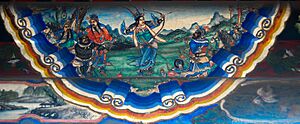
When Liu Bei heard about Lü Bu's attack, he immediately returned to Xiapi. But most of his troops scattered along the way. With his remaining men, Liu Bei moved east to Guangling Commandery, where Yuan Shu's forces defeated him. Liu Bei then retreated to Haixi County. There, hungry and desperate, he surrendered to Lü Bu. This happened around early 196. Lü Bu was unhappy that Yuan Shu's supplies had not reached him yet. He led his men to welcome Liu Bei. He appointed Liu Bei as the Inspector of Yu Province and ordered him to stay at Xiaopei. Lü Bu declared himself the Governor of Xu Province and remained in Xiapi.
Hao Meng's Rebellion
In July or August 196, Lü Bu's subordinate Hao Meng rebelled against him and attacked his office in Xiapi. Lü Bu's general Gao Shun put down the rebellion with help from Cao Xing, one of Hao Meng's men who refused to betray Lü Bu. Hao Meng was killed. Later that year, Lü Bu used his amazing archery skill to prevent a battle between Liu Bei and Yuan Shu's general Ji Ling. He set up a ji (a type of polearm) at the camp gate. He proposed, "Watch me shoot an arrow at the lower part of the curved blade on the ji. If I hit it in one shot, you must all withdraw your forces. If I don't, you can prepare for battle." He then shot an arrow, hitting the exact spot. Everyone was amazed and called him "Heaven's might!" The next day, they held a party and then withdrew their armies.
Alliances and Conflicts
Joining Cao Cao Against Yuan Shu
In early 197, Yuan Shu declared himself emperor in Shouchun. This was an act of treason against the Han dynasty and Emperor Xian. So, Yuan Shu became the target of attacks from Cao Cao and other warlords.
Earlier, Yuan Shu wanted to form an alliance with Lü Bu and proposed a marriage between his son and Lü Bu's daughter. Lü Bu first agreed. After Yuan Shu declared himself emperor, he sent his man Han Yin to meet Lü Bu and bring Lü Bu's daughter for the marriage. However, Lü Bu changed his mind after Chen Gui convinced him. He remembered how Yuan Shu had rejected him earlier. He sent his men to chase Han Yin's group, retrieve his daughter, and capture Han Yin. Han Yin was sent as a prisoner to Xu and executed.
Peace with Cao Cao
The Han imperial court appointed Lü Bu as General of the Left. Lü Bu sent Chen Deng (Chen Gui's son) to Xu to thank the emperor. In Xu, Chen Deng secretly urged Cao Cao to get rid of Lü Bu. Chen Deng agreed to act as a spy in Xu Province to help Cao Cao. Chen Deng received a promotion, and his father Chen Gui got a salary increase.
When Chen Deng returned to Xu Province, an angry Lü Bu confronted him. Lü Bu held his ji and said, "Your father told me to side with Cao Cao and reject Yuan Shu. Now, I've gained nothing, but you and your father got promoted! You must have tricked me!" Chen Deng remained calm and replied, "When I met Cao Cao, I told him, 'You should treat the General (Lü Bu) like you raise a tiger. Feed it well with meat. If it's not well-fed, it will attack people.' Cao Cao replied, 'You're wrong. He's like a hawk. If it's hungry, it will hunt for you. If it's well-fed, it will fly away.' That's what we talked about." Lü Bu's anger calmed down.
War Against Yuan Shu

Yuan Shu was furious that Lü Bu broke his promise. So, he allied with Han Xian and Yang Feng and sent his general Zhang Xun to attack Lü Bu. Lü Bu asked Chen Gui, "Yuan Shu is attacking me because I followed your advice. What should I do?" Chen Gui replied, "The alliance between Han Xian, Yang Feng, and Yuan Shu is weak. They don't have a common plan and won't last long. They are like chickens tied together, unable to move in sync. My son, Deng, has a plan to separate them."
Lü Bu followed Chen Gui's advice and sent a letter to Han Xian and Yang Feng. He reminded them that he had caused Dong Zhuo's death and that Yuan Shu was a traitor. He urged them to join him against Yuan Shu, promising to share the spoils of war. Han Xian and Yang Feng were pleased and agreed to help Lü Bu. They defeated Zhang Xun at Xiapi and captured Qiao Rui, one of Yuan Shu's officers. Yuan Shu's forces suffered heavy losses, with many soldiers drowning in the river.
Lü Bu, Han Xian, and Yang Feng then attacked Shouchun, Yuan Shu's capital. They traveled by land and water, looting lands along the way. When they reached Zhongli, they had gained much, so they retreated. Before crossing the Huai River back north, Lü Bu sent Yuan Shu a challenging letter. After Lü Bu crossed the Huai River, Yuan Shu personally led 5,000 soldiers to the riverbank. Lü Bu's forces, on the opposite side, laughed at their enemy and retreated.
Conflict with Zang Ba
Around this time, Xiao Jian was the Chancellor of Langya State. He was a cautious man and had no contact with Lü Bu. Lü Bu wrote to Xiao Jian, reminding him that he had caused Dong Zhuo's death. He explained that he came from far away and was not fighting for southeastern lands. He compared Xiao Jian's behavior to acting like an emperor in a small area. He warned Xiao Jian that he was not Yue Yi (a famous general) and Xiao Jian was not Tian Dan (a famous defender). After receiving the letter, Xiao Jian sent five fine horses as gifts to Lü Bu.
Later, Zang Ba defeated Xiao Jian and took his resources. When Lü Bu heard this, he wanted to attack Zang Ba in Ju County. But Gao Shun advised him against it, saying, "General, you are famous for causing Dong Zhuo's death. Even if you stay where you are, people will still fear you. You shouldn't be so reckless as to lead your men into battle yourself. If you lose, your reputation will suffer greatly." Lü Bu ignored him. Zang Ba heard about Lü Bu's violent ways, so he stayed inside Ju County and defended it strongly. Lü Bu could not conquer Ju County, so he withdrew his forces and returned to Xiapi. After this, several bandit generals, including Zang Ba, Sun Guan, Wu Dun, Yin Li, and Chang Xi, all submitted to Lü Bu, greatly increasing his power.
Battle of Xiapi and Downfall
Conflict in Xiaopei
In 197, Yang Feng and Han Xian were bandits who raided areas between Yang and Xu provinces. Lü Bu ordered them to raid Liu Bei's supplies. However, Liu Bei successfully tricked them. Yang Feng was killed, while Han Xian managed to escape.
Around late 197 or early 198, Lü Bu sided with Yuan Shu again. Lü Bu also ordered his soldiers to gather gold and money to buy military horses. However, Liu Bei led his troops and managed to capture the gold and money. In response, Lü Bu sent Gao Shun and Zhang Liao to attack Liu Bei at Peicheng. Cao Cao sent Xiahou Dun to support Liu Bei, but Gao Shun defeated Liu Bei and the reinforcements from Cao Cao.
Cao Cao's Army Attacks Xu Province
In the winter of 198, Cao Cao personally led a campaign against Lü Bu and surrounded Xiapi. He wrote a letter to Lü Bu, explaining the benefits of surrendering and the dangers of resisting. Lü Bu wanted to surrender, but Chen Gong and others knew they had already angered Cao Cao (by betraying him earlier). So, they urged Lü Bu to change his mind.
When Cao Cao's army reached Pengcheng, Chen Gong told Lü Bu, "We should attack the enemy now. Our troops are well-rested, while the enemy is tired. We are sure to win." Lü Bu replied, "Why don't we wait for them to attack first? After that, we'll destroy them in the Si River." As Cao Cao's attacks grew stronger, Lü Bu went up the White Gate Tower (the viewing platform above Xiapi's main south gate). He told his men, "Cao Cao doesn't intend to cause trouble for you. I should surrender to this wise lord." Chen Gong said, "The tricky Cao Cao is no wise lord! Surrendering to him is like hitting a rock with an egg! How can you expect to live?"
Lü Bu sent Xu Si and Wang Kai to ask Yuan Shu for urgent help. Yuan Shu said, "Lü Bu refused to send his daughter here, so it's expected that he'll meet his doom. Why does he seek help from me again?" Xu Si and Wang Kai replied, "If Your Highness doesn't save Lü Bu, you'll be risking your own doom. If Lü Bu is destroyed, Your Highness will be next." Yuan Shu then prepared his troops and claimed he would send reinforcements to Lü Bu. Meanwhile, Lü Bu thought Yuan Shu was unwilling to help because he hadn't sent his daughter. So, one night, he tied his daughter to himself and tried to break out of the siege. However, they met Cao Cao's soldiers, who fired arrows at them, forcing them to return to Xiapi. Lü Bu led about 1,000 riders out of the city to fight the enemy, but he lost the battle and retreated back to Xiapi, not daring to venture out again.
Lü Bu ordered Chen Gong and Gao Shun to defend Xiapi, while he personally led some horsemen to attack Cao Cao's supply routes. However, before he left, his wife told him, "General, I know you want to attack Cao Cao's supply lines, but Chen Gong and Gao Shun don't get along. If you leave, they might not work well together to defend the city. If something goes wrong, what will happen to you, General? I hope you'll think carefully and not be misled by Chen Gong and others. When I was in Chang'an, you abandoned me, but I managed to return because Pang Shu secretly protected me. You don't need to worry about me now." Lü Bu felt sad after listening to his wife and could not decide what to do.
Chen Gong told Lü Bu, "Cao Cao has come a long way and won't be able to last much longer. General, you can take some troops and set up a camp outside the city, while I and others will stay to defend the city. If the enemy attacks you, I'll lead the city's soldiers to attack them from behind. If they attack the city, you can reinforce the city from outside. Within ten days, the enemy's supplies will run out, and we can defeat them easily." Lü Bu agreed with Chen Gong's idea. However, Lü Bu's wife said, "In the past, the Caos treated Gongtai (Chen Gong) very well, but he still turned against them and joined you. Now, you treat Gongtai no less than Cao Cao did, and you plan to trust him with the entire city and your family, while you go out alone? If something happens, I won't be your wife anymore!" Lü Bu then changed his mind.
The Betrayal of Hou Cheng
Yuan Shu was unable to help Lü Bu. Cao Cao could not conquer Xiapi despite strong attacks, and his men were getting tired. He wanted to stop the campaign and return to Xuchang. But his advisors Guo Jia and Xun You urged him to continue. He then ordered his troops to use the waters of the Yi and Si rivers to flood Xiapi. After a three-month siege, Lü Bu's soldiers lost morale, and his men slowly turned against him. On 7 February 199, Lü Bu's subordinates Hou Cheng, Song Xian, and Wei Xu captured Chen Gong and Gao Shun. They then led their troops to surrender to Cao Cao.
Lü Bu and his remaining men went up the White Gate Tower and surrendered when they saw they were surrounded. One account says Lü Bu asked his men to kill him and bring his head to Cao Cao, but they refused. Lü Bu then surrendered to Cao Cao.
Downfall and Death
Lü Bu was tied up and brought before Cao Cao. He said, "I'm tied too tightly. Can you loosen the ropes?" Cao Cao replied, "A tiger must be tightly restrained." Lü Bu then said, "My lord, you only feared me. Now that I have surrendered, you should have no more worries. My lord, why don't you spare me and let me help you lead your troops? This way, you won't need to worry about not being able to bring peace to the Empire." When Cao Cao seemed to consider this, Liu Bei interrupted, "My lord, haven't you seen what Lü Bu did to Ding Jianyang and Grand Preceptor Dong?" Cao Cao rubbed his chin. Lü Bu shouted at Liu Bei, "You're the most untrustworthy person!"
Other historical texts add more details to this conversation.
One text recorded:
Lü Bu told Cao Cao, "I treated my subordinates well, but they betrayed me when I was in trouble." Cao Cao replied, "You abandoned your wife, and you wanted your men's wives. You call this 'treating them well'?" Lü Bu remained silent.
Another text recorded:
Lü Bu asked Cao Cao, "My lord, you've lost weight. Why?" Cao Cao asked him, "How do you recognize me?" Lü Bu replied, "When I was in Luoyang, I saw you at the Wen Family Gardens." Cao Cao said, "Yes, I forgot. I lost weight because I'm sad about not having recruited you earlier." Lü Bu said, "In the past, Duke Huan of Qi forgave Guan Zhong for injuring him and even made Guan his chancellor. Now, can you allow me to serve you?" As Lü Bu was tightly bound, he turned to Liu Bei and said, "Xuande, you're a guest here. I'm a prisoner. Why don't you say anything to help me?" Cao Cao laughed and said, "Why do you turn to him instead of speaking directly to me?" Cao Cao thought about sparing Lü Bu and ordered his men to loosen Lü Bu's bonds. However, Wang Bi, an official under Cao Cao, interrupted, "Lü Bu is a powerful enemy, and his allies are nearby. He should not be spared." Cao Cao then said to Lü Bu, "I wanted to spare your life, but my Registrar says no. So, what should I do?"
Cao Cao then ordered Lü Bu to be executed.
Historical Views on Lü Bu
Chen Shou, who wrote Lü Bu's biography in the Sanguozhi, commented:
Lü Bu had the strength of a tiger, but he lacked the wisdom of a smart person. He was careless and moody, and only cared about what he could gain. Throughout history, people like him always ended up being destroyed.
In the main text of Lü Bu's biography, while describing the Battle of Xiapi, Chen Shou also wrote:
Although Lü Bu was a brave and powerful warrior, he lacked wisdom and was always suspicious of others. He could not control his subordinates even though he trusted them. His men had their own goals and were very disunited, which is why he kept losing battles.
Fan Ye, who wrote Lü Bu's biography in the Houhanshu, commented:
[...] Lü Bu was unpredictable and changed his mind often.
Lü Bu's Family
Not much is known about Lü Bu's family from historical records. We know he had a wife and a daughter, but their names are not recorded. Lü Bu left his wife behind when he fled from Chang'an. However, his subordinate Pang Shu secretly protected her and later returned her to her husband. She is most notably mentioned during the Battle of Xiapi, when she warned Lü Bu not to trust Chen Gong too much.
Lü Bu's daughter was initially planned to marry Yuan Shu's son as part of an alliance. But Lü Bu broke his promise and took her back when she was on her way for the marriage. When Xiapi was surrounded by Cao Cao's forces, Lü Bu tried to take his daughter out of the city to deliver her to Yuan Shu. He hoped Yuan Shu would send reinforcements after receiving his daughter. However, Lü Bu failed to break out of the siege and returned to Xiapi with her. What happened to Lü Bu's wife and daughter after his death is not known.
In the historical novel Romance of the Three Kingdoms, Lü Bu has two wives, a concubine, and a daughter. His concubine is Diaochan, a made-up character and Wang Yun's foster daughter. She is said to have been with him after he caused Dong Zhuo's death and during the Battle of Xiapi. Lü Bu's first wife in the novel, Lady Yan, is based on his real-life wife. His second wife, mentioned only by name, is a fictional daughter of Cao Bao. The role of Lü Bu's daughter in the novel is similar to her historical counterpart. She is also unnamed in the novel but is called "Lü Lingqi" (simplified Chinese: 吕玲绮; traditional Chinese: 呂玲綺; pinyin: Lǚ Língqǐ) in video games and popular culture.
Lü Bu's Subordinates
- Chen Gong
- Zhang Liao
- Gao Shun
- Zang Ba
- Hao Meng
- Cao Xing
- Cheng Lian
- Song Xian
- Wei Xu
- Hou Cheng
- Zhang Miao
- Zhang Chao
- Xu Si
- Wang Kai
- Xue Lan
- Li Feng
Lü Bu in Romance of the Three Kingdoms
The 14th-century historical novel Romance of the Three Kingdoms tells dramatic stories from the Three Kingdoms period. In this novel, Lü Bu is shown as an almost unbeatable warrior. However, he is also an ineffective leader with many character flaws. While the novel follows the general historical events, it exaggerates and adds emotional details to many stories about Lü Bu. It draws inspiration from traditional operas and folk tales.
Here are some made-up stories about Lü Bu from Romance of the Three Kingdoms:
- Battle of Hulao Pass
- List of fictitious stories in Romance of the Three Kingdoms#Lü Bu and Diaochan
- Battle of Xiapi#In fiction
See also
 In Spanish: Lü Bu para niños
In Spanish: Lü Bu para niños
- Lists of people of the Three Kingdoms
 | Emma Amos |
 | Edward Mitchell Bannister |
 | Larry D. Alexander |
 | Ernie Barnes |


